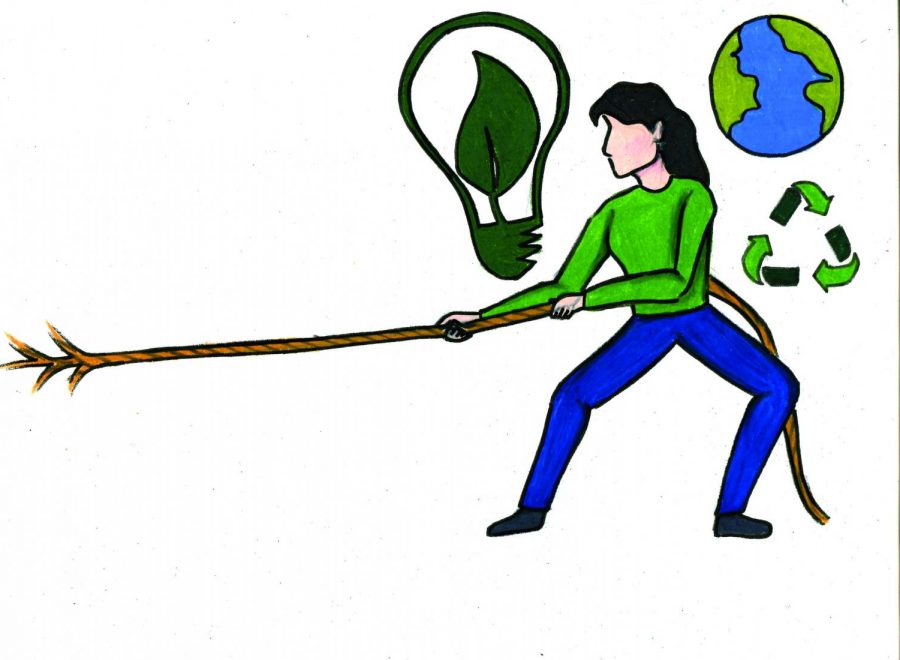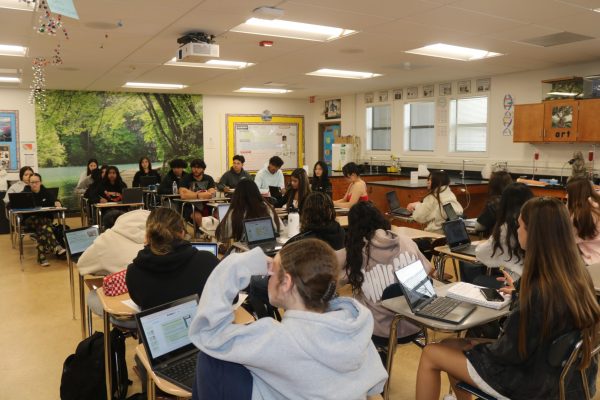Earth is warming at an alarming rate
Everyone longs to live in a utopia, but the upsetting reality of the earth is overwhelming as it rapidly drifts away from the perfect world people envision in their minds.
Earth’s climate is dramatically fluctuating, making it difficult for living organisms to coexist with their surroundings. Scientists say the cause for the rise of global temperature lies in greenhouse gases in the air emitted by humans.
Such gases, including carbon dioxide and methane, capture and trap heat in the air, resulting in climate change. More heat is trapped in the atmosphere than released back into the space, resulting in the warming of earth’s surface.
It leads to melting glaciers, warming oceans and unpredictable weather patterns. Daily human usage and production play a role in global warming.
Global warming mostly comes from the combustion of fossil fuels in cars, buildings, factories, and power plants, while other contributors include methane released from landfills, natural gas and petroleum industries, and agriculture, according to National Geographic.
“Humans have obviously contributed to it through the burning of fossil fuels followed by the unclean air techniques that we use,” senior Lindsey Lee said. “There’s a project in place trying to take carbon out of the air and put it back into the ground. It’s only a prototype, but there’s a lot of ways we can reduce it and I think it’s going to have a dramatic effect.”
Through the causes of climate change, cool days have now turned into a prolonged number of frost days. It soon becomes long days of scorching temperatures, and the lack of pleasant climate leaves many concerned.
As the days turn from weeks to months, the summer is transformed into a painfully long drought, and the lack of availability of water impacts everyday lives greatly.
“[We have to] hope that there’s enough water to go around this world because when we get hotter and drier, we’re not going to have enough fresh drinking water,” AP Environmental Science teacher Dina Anderson said. “We already have fresh drinking water issues and we can’t go more than three days without fresh drinking water and that’s probably our number one concern.”
Although there is much discussion of the gradual decrease in the availability of water, some are less likely to be affected than others.
“I don’t see it directly affecting me and most of that has to do with affluence and the area we’re in,” senior Grace Lewis said. “The effects of climate change mostly affects people in lower income communities. I don’t see the effects as much on a local level as on a global level.”
While the availability of drinking water is steadily decreasing for humans, animals experience hardships with the shift of their environment as well. The endangerment of species is becoming dangerously common within the ecosystem, and even the first extinction of a mammal, the Bramble Cay melomys (Melomys rubicola), solely due to climate change, has already occured according to NPR.
The decline in the availability of resources, inconsistent climate and species’ populations are all effects caused by human destruction to the environment.
“We’re definitely the cause,” Anderson said. “Anthropogenic climate change is what is happening. [With] the amount of fossil fuels we’re burning, trees we’re deforesting, just those two things alone, cause anthropogenic climate change.”
With the excessive amount of carbon dioxide humans have put into the atmosphere, reversing the effects of global warming is seen as a highly challenging task.
“We can definitely slow it down since we’re the ones causing it,” senior Jessica Merchant said. “We can drive cleaner cars or not be so wasteful and use green friendly technology, but I don’t think we can reverse it now.”
Scientific studies support such claims and predictions while observing the continuously rising temperatures.
“We have already gone beyond one degree. I think most scientists now say that the two degrees celsius mark they wanted to stay below, would cause less dramatic effects,” marine biology teacher Doug Mason said. “There’s no way we would be able to stay under two degrees. Most are now predicting over four degrees celsius of change and I think that will come with very dramatic effects. Now it’s just the question of how we would respond and what we would do.”
Alongside the hope for a new form of technology that would slow down the process and impacts of global warming, humans can take a small and cautious approach to this process in means to contribute. Although most believe that transportation is the biggest contributor to global warming, there is a key aspect that most people overlook.
“The biggest thing, believe it or not, even though most people focus on the transportation section, is going to be your diet,” Mason said. “Eating meat is going to be a problem into the future. I think we’re going to have to change our diet. And of course we’re going to have to get off of fossil fuels as our primary energy source.”
Mason says that in addition to efforts that can be made by citizens locally, finding clean and renewable energy sources is key to slowing down the process of global warming.
Adapting technology that uses wind and solar energy not only utilizes natural forms of energy in our environment, but also prevents the usage of fossil fuels.
It is believed that if transportation, consumption, and renewable energy are kept in mind, humans have the ability to partially undo the mess created.
“People who don’t believe in it or aren’t doing anything against it are only making it worse,” senior Asher Golden said.





